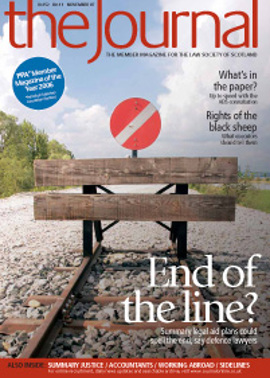Counting on your CA

When I was training (admittedly back in the days when the guinea was still in common use!) it seemed to me that there were two criteria for solicitors selecting an accountant: what school did they go to; and which golf club were they a member of.
It would be fair to say things have moved on a bit since then. Both the legal and accounting professions have adopted a radically more commercial approach to carrying out their business, and I am sure all accountants realise that their solicitor clients’ expectations far exceed a nicely presented set of accounts discussed over a round of golf.
A survey in 2004 identified that approximately two thirds of business people speak to and consult their accountants about general business issues. This percentage far exceeds that of people who are prepared to talk to their solicitors, banks and indeed colleagues.
This indicates that a high degree of reliance and trust is placed on the advice and opinions of accountants. Is this justified, and indeed are accountants able to live up to this image? I am sure it is not that the accountancy profession is perceived as squeaky clean. Various very high profile scandals over the last few years have put paid to this notion, if indeed it ever existed.
Been there, done that
In my opinion, and I may well fall out with a few legal friends over this, accountants are considered as a better source of business advice, ahead of solicitors and others, because accountants have been quicker to embrace a commercial approach to:
- managing their businesses;
- succession planning;
- inter-firm mergers;
- developing IT systems.
Whilst it may not be true to say that the above applies at all levels of comparison between the legal and accountancy professions, and certainly not at the larger legal firms, I do think it is true for the small and medium sized sector. I think that accountants realised, albeit prompted by outside sources, a decade or so ago that the days of the two/three partner general practice firm were numbered and that a realistic and coherent plan for future practice growth and succession was essential for future success, and even existence.
My own experience indicates that this is a concept that small and medium sized legal practices in Scotland now appreciate is essential to the future of the firm.
Given the similarity of the two professions and the common problems facing them, it follows that the legal profession should seriously consider using the experience gained by the accountancy profession to promote its own development. If nothing else there is the element of avoiding mistakes that have already been made.
Coming to terms
My own experience was that of a partner in a four partner firm. There were two main factors which led to us reviewing our position:
- increased legislation, not only through accountancy, auditing and taxation, but also money laundering and financial services, made us realise that our ability to deliver an all round service to our clients was being eroded;
- the succession of the older partners and the ability of the practice to pay out their capital accounts on retirement.
I know that my firm was not alone amongst accountants in recognising and trying to address these issues. I also know from my own recent experience with my solicitor clients that these are issues which the legal profession is now trying to come to terms with.
On the basis that there is no point reinventing the wheel, solicitors should have no hesitation in speaking to their accountant on this subject as there is every chance that the accountant will be in a position to provide constructive advice. Looking at the situation from another point of view I would hope that on an ongoing basis accountants should be reviewing their solicitor clients with a view to identifying these issues and offering constructive advice in addressing them.
Spin-offs
In my own firm’s case, we took the decision to merge with a similar size firm, and whilst we were bedding in the merger we looked at ways of developing the practice to ensure that our initial aims were achieved. Out of all of this we developed:
- A future plan for the firm. This was based on the hopes and the aspirations of the individual partners.
- A human resources programme. It is essential we recruit and retain the correct people.
- A marketing policy. There is no point in attracting work for the sake of it. We realised that we needed a policy to first identify the clients that we wished to draw and then putting a policy in place to interest them.
- Financial reporting systems. It is critical to the management of the practice that we receive up-to-date financial information in a format that enables us to measure our performance. These systems continue to be modified on an ongoing basis to meet the practice needs.
- Time recording, work in progress and debt management. This is to ensure that we convert our work in progress into debtors and then cash as soon as possible.
- Introduction and development of an IT policy. We identified that IT was vital to all areas of the practice management, and we also recognised that it was essential that we develop a coherent policy to cater for our needs on an ongoing basis.
The above is just a summary of the major areas addressed, but to suggest everything has gone to plan would be incorrect! I do think that possibly the most valuable lesson I have learnt from my firm’s development is the practical experience I have gained through being so closely involved. Whilst not claiming to be an expert, I think that my involvement has given me a unique insight into practice development.
No surprises, please
As I mentioned above, the accountancy profession, certainly in small to medium sized practices, has been quicker to adopt a more commercial approach, and to achieve this, than its legal counterparts, and I am by no means alone in my experience.Solicitors are now realising that they are being driven by the same outside pressures as accountants, if not more, and I hope they appreciate that their accountants are in a position to give advice with the future planning and development of their practices.
The matters I have covered above are more concerned with practice succession and development, but the solicitor should also be looking to maximise his relationship with his accountant in as many other aspects as possible.
In my experience I find solicitor clients are looking for a relationship of trust where no nasty surprises await them. To be told a week before the payment deadline, that a profit increase means the payments on account are insufficient and there will be a significant balancing payment is, I am sure, not conducive to good client-professional adviser relationships!
This issue can be easily addressed by both parties meeting in advance to agree a timetable for the preparation of the accounts, tax returns and other compliance work. This identifies individual responsibilities, and both parties should adhere to the timetable to avoid any last minute nasty surprises.
Two-way relationship
I think it goes without saying that the solicitor client will also be looking for work referrals from their accountant, and vice versa. At all levels, on both sides it is important to build up a relationship of trust so that work can be passed across without any fear that the client will not receive the best service.
Also, but more common to smaller solicitor clients, I find that they may be looking for tax advice in an area with which they are not familiar. I have no problem with them contacting my tax department for advice, and provided the issue is cleared up over one or two phone calls or emails I am happy not to charge for this. I think this attitude promotes a good relationship with clients and I can honestly say I don’t think it has ever been abused.
It is not just the accountant client services team and the designated cashroom partner who should be involved in the relationship, but it is up to the accountant to ensure that on an office-wide basis the staff are aware of the services offered by the legal firm.
Both parties to the relationship should be aware of the services provided by the other and should be communicating on a regular basis so that these can be developed to the maximum benefit of both parties. This is best achieved by having one point of contact in both firms and that person will be responsible for the communication, both with the other firm and the staff in their own firm.
Great expectations
My partners have asked me if there is an issue with fees and my response is no. I find that provided proper communication is maintained and the client gets at least the service they expect, fee levels are not a real issue.
Speaking with my accountant’s hat on, one point I would ask all solicitors to bear in mind is that presentation of partnership and individual tax returns is required to meet a deadline, where non-compliance results in penalties. Whilst I am not suggesting that all solicitors agree and sign off their accounts and submit their personal tax information at the last minute, it is fair to say that such instances do arise. It may not be much of a problem to cover off the late submission of one or two tax returns; however where this situation covers 10 or so legal practices with four or five partners it is not long before the accountant is under severe pressure to meet these clients’ expectations, reasonable or not!
I started this article with what a solicitor wanted from his accountant 40 years ago. Now, it must be:
- cost effective, timeous compliance services;
- advice on all aspects of managing the business;
- cross referrals.
How the world has changed!
Bob Dallas is managing partner and a licensed insolvency practitioner with Campbell Dallas CA, specialists in the SME market with offices in Aberdeen, Bearsden, Paisley, Perth and Stirling. Bob can be contacted on 0141 887 4141.
In this issue
- The shape of your future
- The law and the forum
- End of the line?
- Summary justice: the big picture
- Now it's your turn
- Flying south
- Legal rights and the black sheep
- Mediation innovation
- Counting on your CA
- The risk of paper cuts
- Society hits the Net at Murrayfield
- Leading the charge
- Computer says no
- Who, what, where, when, why?
- Getting in on the Act
- Scottish Solicitors' Discipline Tribunal
- Website reviews
- Book reviews
- Well funded work
- PSG offers an offer






